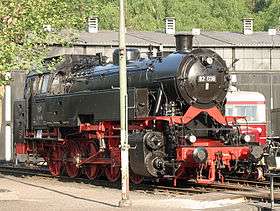DB Class 82
The DB Class 82 was a goods train tank locomotive with the Deutsche Bundesbahn in Germany, that was built in the period after the Second World War and was intended for shunting and normal rail services. They were to replace the ten-coupled state railway (Länderbahn) engines and also the accident-prone Class 87 DRG Einheitslok (standard locomotive).
| DB Class 82 | |
|---|---|
 DB Class 82 in Bochum-Dahlhausen | |
| Number(s) | DB 82 001 – 82 041 |
| Quantity | 41 |
| Manufacturer |
|
| Year(s) of manufacture | 1950–1955 |
| Retired | 1972 |
| Wheel arrangement | 0-10-0T |
| Axle arrangement | E h2t |
| Type | Gt 55.18 |
| Track gauge | 1,435 mm (4 ft 8 1⁄2 in) |
| Length over buffers | 14,080 mm (46 ft 2 3⁄8 in) |
| Empty weight | 69.7 tonnes (68.6 long tons; 76.8 short tons) |
| Service weight | 91.8 tonnes (90.4 long tons; 101.2 short tons) |
| Adhesive weight | 91.8 tonnes (90.4 long tons; 101.2 short tons) |
| Axle load | 18.4 tonnes (18.1 long tons; 20.3 short tons) |
| Top speed | 70 km/h (43 mph) |
| Indicated Power | 949 kW (1,290 PS; 1,273 hp) |
| Driving wheel diameter | 1,400 mm (4 ft 7 1⁄8 in) |
| Valve gear | Heusinger |
| No. of cylinders | Two, outside |
| Cylinder bore | 600 mm (23 5⁄8 in) |
| Piston stroke | 660 mm (26 in) |
| Boiler Overpressure | 14 bar (1.40 MPa; 203 psi) |
| No. of heating tubes | 115 |
| No. of smoke tubes | 38 |
| Heating tube length | 4,000 mm (13 ft 1 1⁄2 in) |
| Grate area | 2.39 m2 (25.7 sq ft) |
| Radiative heating area | 12.60 m2 (135.6 sq ft) |
| Superheater area | 51.90 m2 (558.6 sq ft) |
| Evaporative heating area | 122.21 m2 (1,315.5 sq ft) |
| Water capacity | 11 m3 (390 cu ft) or 11,000 litres (2,400 imp gal; 2,900 US gal) |
| Fuel | Coal: 4 tonnes (3.9 long tons; 4.4 short tons) |
| Auxiliary brake | 82 038 – 82 041 fitted with counterpressure brake |
It was the first of the DB's so-called Neubaudampflokomotiven or newly designed steam locomotives, and was built by the firms of Krupp and Henschel in 1950 and 1951 and also by the Maschinenfabrik Esslingen in 1955. Although they were ten-couplers, the 41 engines were also suitable for lines with tight curves such as the Hamburg Harbour railway. To improve curve running the first and last axles were fitted with Beugniot levers. The last two examples were also equipped with Riggenbach counterpressure brakes, which enabled their operation on steep lines. The locomotives were able to haul 800 tonne trains at up to 70 km/h.
Deployment
The engines were predominantly employed in the marshalling yards at Bremen and Hamm as well as on the harbour lines of Emden and Hamburg. The 82s could also be seen on normal railway duties on the steep inclines of the Westerwald and in the Black Forest on the Murg Valley Railway.
Retirement began as early as 1966, the final locomotive depot being Bw Koblenz-Mosel, where the last one was mustered out in 1972 .
Preserved
Locomotive 82 008, the last existing example of its class, has been looked after in Bw Neumünster since early 2003 by the Rendsburger Eisenbahnfreunden.
See also
- List of DB locomotives and railbuses
External links
| Wikimedia Commons has media related to DB Class 82. |